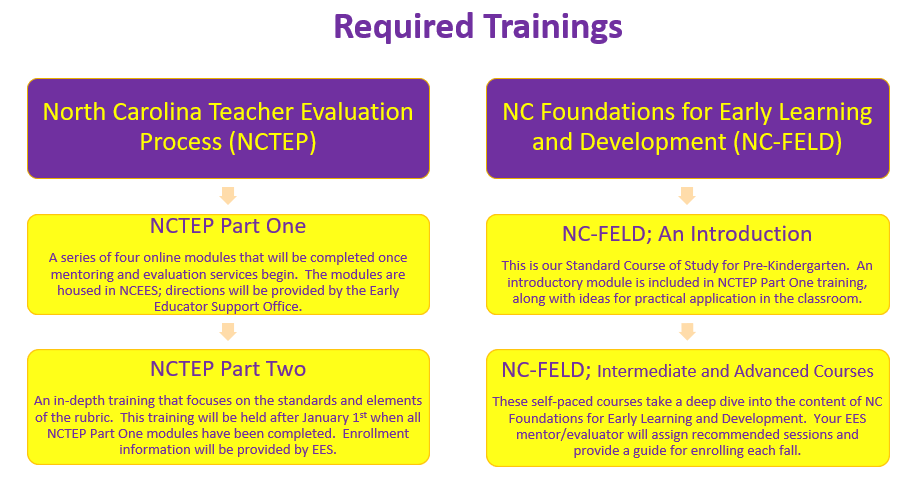Professional Development

North Carolina Teacher Evaluation Process (NCTEP)
NCTEP Part One
NCTEP–Part One Training is a series of four, self-paced online modules required for all NC Pre-K and Developmental Day teachers and their site administrators who are served by the Early Educator Support Office to receive mentoring and evaluation services. These modules give an overview of the NC Professional Teaching Standards and the evaluation process. These modules are accessed through NCEES for teachers and a quick links guide for site administrators. Instructions for accessing these modules are provided by the Early Educator Office once the teacher is enrolled and a Mentor/Evaluator is assigned. Mentor/Evaluators guide teachers through completion of this course during the first year of enrollment.
NCTEP Part Two
NCTEP–Part Two training is a one-day training required for all NC Pre-K and Developmental Day teachers who are served by the Early Educator Support Office in order to receive mentoring and evaluation services. This training provides an in-depth review of the NC professional teaching standards and further explains the evaluation process. NCTEP Part Two training is conducted by Early Educator Support Office staff and allows time for discussion and collaboration with other participants. NCTEP Part Two training is held later in the year to allow time for all newly enrolled teachers to complete NCTEP Part One training. More information and registration information will be provided throughout the year.
NC Foundations for Early Learning and Development; An Introduction
Early Childhood Educators (ECEs) who are enrolled and working with the Early Educator Support Unit to attain and/or maintain NC Birth-through-Kindergarten Licensure are required to align their classroom instruction with the NC Foundations for Early Learning and Development (Foundations) as their Standard Course of Study (SCOS). This alignment supports implementation of effective instructional practices, engaging and stimulating learning environments, and appropriate learning and development in all domains for all children. To inform and support the alignment of curricula and the NCSCOS for Pre-K, enrolled lead teachers will have access to professional development and individualized classroom-based instructional support on Foundations. An introduction to Foundations is provided during Module Four of NCTEP Part One.
NC Foundations for Early Learning and Development; Intermediate Course
The Intermediate Course for NC Foundations for Early Learning and Development (Foundations) is a series of eight, self-paced online modules. They are self-selected or assigned by Mentor/Evaluators to meet the individual professional development needs of educators enrolled in Early Educator Support. This training provides an overview of the five developmental domains used by Foundations to establish learning goals for preschool children. An additional module provides information for supporting dual language learners in the classroom. Enrollment information will be provided by EES at the beginning of each school year.
NC Foundations for Early Learning and Development; Advanced Course
The NC Foundations for Early Learning and Development, Advanced Course for Emotional and Social Development is a series of eleven, self-paced online modules. These modules are assigned based on individual need and should also be used as a resource for meeting specific professional development goals. Teachers will work with their mentor and evaluator to choose modules that most closely align with goals for professional growth. This training is an in-depth review of instructional practices for emotional and social learning that have been linked with the NC Foundations for Early Learning and Development and the NC Professional Teaching Standards. Specific strategies and resources are provided that promote emotional and social development in preschool children. Enrollment information will be provided by EES at the beginning of each school year.